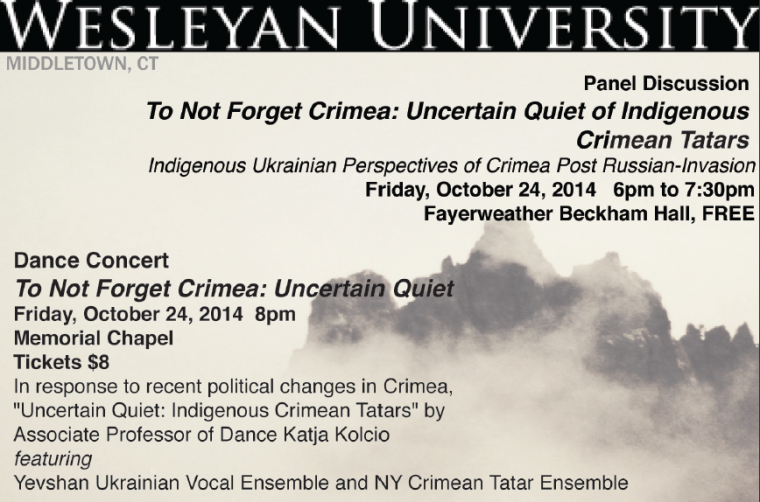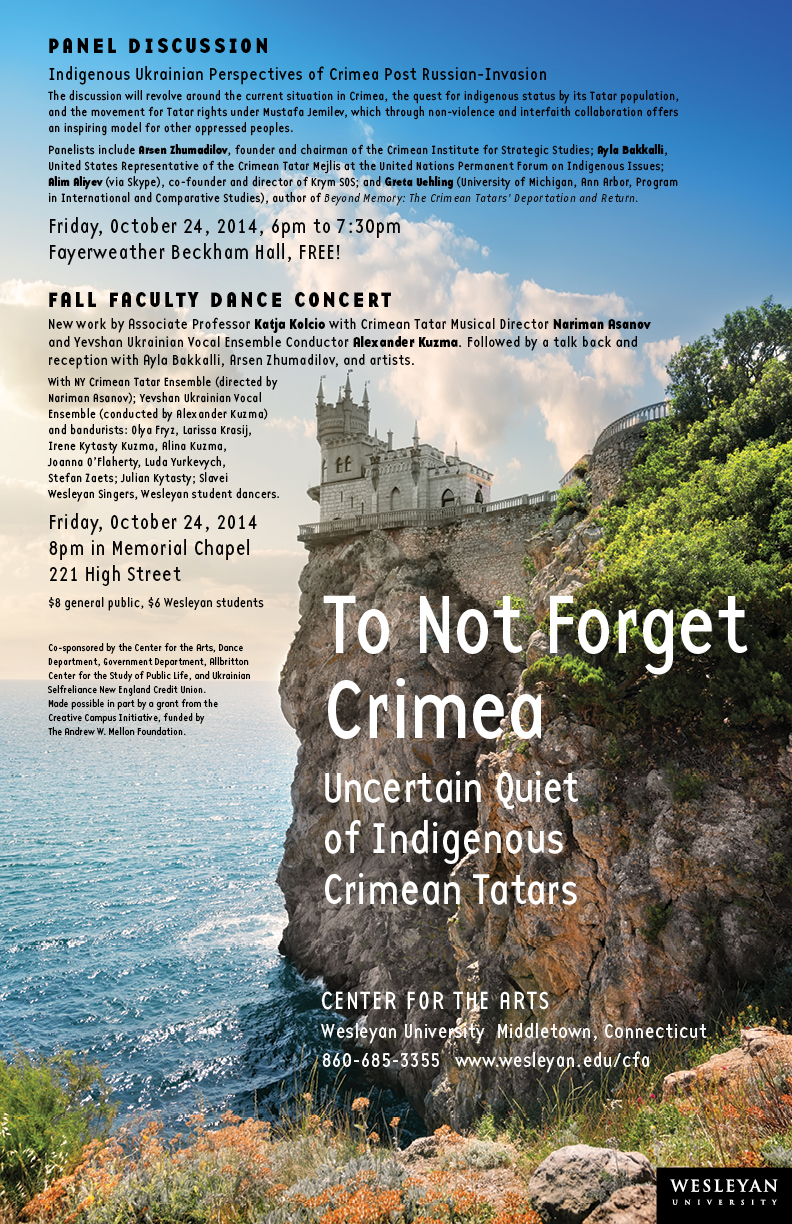Crimea, Tatar Rights Explored at Panel Discussion, Multimedia Performance


On Oct. 24, the Dance Department and Center for the Arts present “To Not Forget Crimea: Uncertain Quiet of Indigenous Crimean Tatars,” a panel discussion and the Fall Faculty Dance Concert by Associate Professor of Dance Katja Kolcio.
While international media and political leaders are ignoring the situation in Crimea, this event draws public attention to the widespread violation of the Tatars’ human rights and the degree to which the Russian Occupation has forced them out of their ancestral homeland.
The evening will begin with a free panel discussion, “Indigenous Ukrainian Perspectives of Crimea Post Russian-Invasion,” from 6 to 7:30 p.m. in Fayerweather Beckham Hall. The discussion will revolve around the current situation in Crimea, the quest for indigenous status by its Tatar population, and the movement for Tatar rights under Mustafa Jemilev, which through non-violence and interfaith collaboration offers an inspiring model for other oppressed peoples.
The event will be live streamed; see here for information and the live stream link.
Panelists will include Arsen Zhumadilov, founder and chairman of the Crimean Institute for Strategic Studies; Ayla Bakkalli, United States representative of the Crimean Tatar Mejlis at the United Nations Permanent Forum on Indigenous Issues; and Greta Uehling, lecturer at the University of Michigan’s Program in International and Comparative Studies, and author of Beyond Memory: The Crimean Tatars’ Deportation and Return.
Alim Aliyev, co-founder and director of Krym SOS—the major support-network, based in Lviv, Ukraine, that is supporting Crimean refugees and helping them find housing—will participate in the discussion via Skype.
The panel discussion will be followed by the premiere performance of “To Not Forget Crimea: Uncertain Quiet of Indigenous Crimean Tatars” at the Fall Faculty Dance Concert. The event begins at 8 p.m. in Memorial Chapel.
In response to recent political changes in Crimea, Kolcio, in collaboration with with New York Crimean Tatar Ensemble Musical Director Nariman Asanov and Yevshan Ukrainian Vocal Ensemble Conductor Alexander Kuzma, will explore issues of historical memory, cultural narrative, and the quest for human rights, as they relate to the history of Tatars, native inhabitants of Crimea, and their complex relationships with Ukraine and Russia. The performance will incorporate film footage; live music by the New York Crimean Tatar Ensemble directed by Asanov; the Yevshan Ukrainian Vocal Ensemble conducted by Kuzma and bandurists; the Wesleyan University student vocal group Slavei; and Wesleyan student dancers.
The performance will be followed by a talk back and reception with Kolcio, Bakkalli, Zhumadilov and the featured artists. Kolcio’s primary research interests lie in social somatic theory and research methodology, investigating the role of physical engagement and creativity in practices of knowledge production, as well as in 20th century dance history.
Tickets for the performance are $8 for the general public, senior citizens, Wesleyan faculty/staff/alumni, and non-Wesleyan students; and $6 for Wesleyan students. Tickets are available online, by phone at 860-685-3355, or in person at the Wesleyan University Box Office. Tickets also may be purchased at the door beginning one hour prior to the performance, subject to availability.
This project is co-sponsored by Wesleyan University’s Center for the Arts, Dance Department, Government Department, Allbritton Center for the Study of Public Life, and the Ukrainian Selfreliance New England Credit Union. Made possible in part by a grant from Wesleyan University’s Creative Campus Initiative, funded by The Andrew W. Mellon Foundation.

